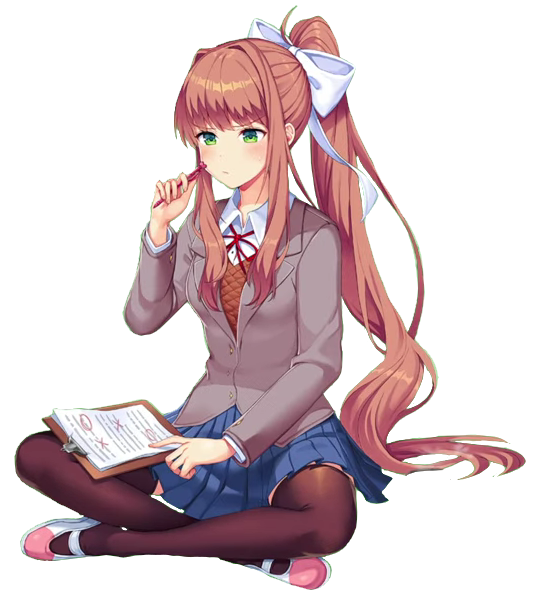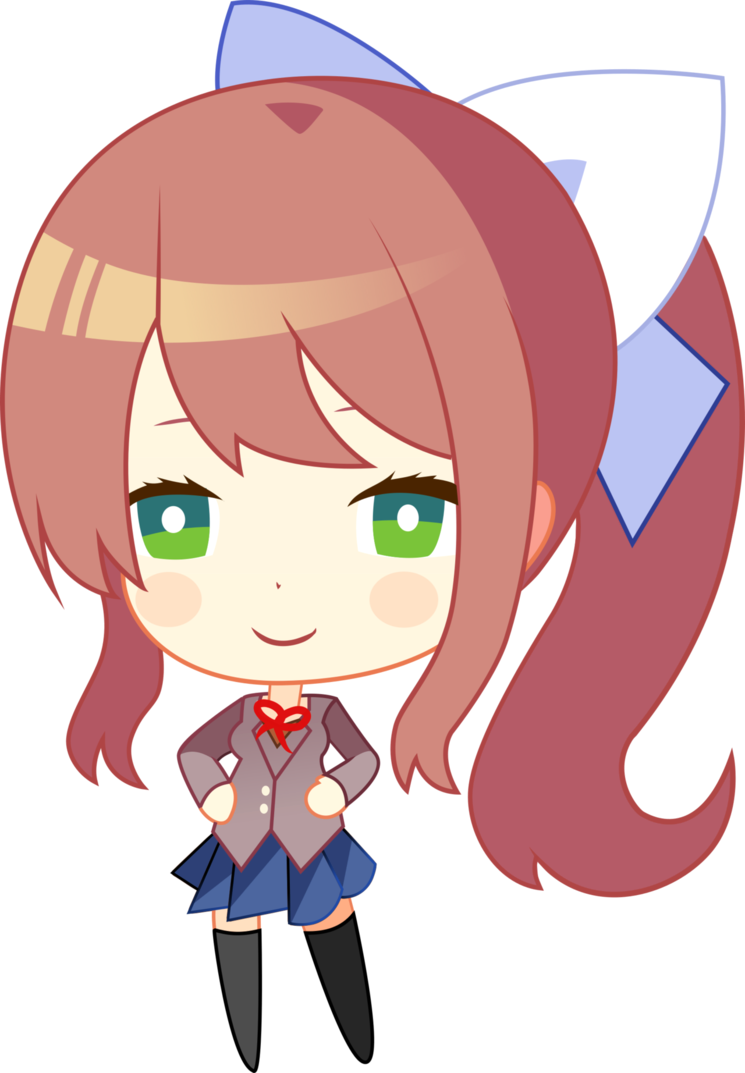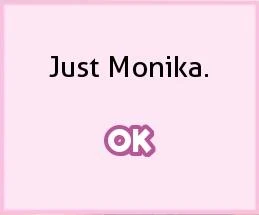Some people have manifestos about the old web, or their opinions on censorship and capitalism with regards to the internet. MY manifesto is that Monika from Doki Doki Literature Club is a deeply misunderstood character by the fandom, and this is a hill I will die on. Almost every time someone brings her up, she is characterized as a cold-hearted, evil, manipulative yandere who's jealous of the other girls and is madly in love with the player which in my personal opinion is completely antithetical to her actual portrayal in-game. So, here's me rambling for way too long about my much-too-strong opinions on this character and why she is e v e r y t h i n g to me.
Monika Character Analysis
Monika is many things. As a video game character, she is charismatic, intelligent, extroverted but avoids confrontation, and a perfectionist. Outside of the game-within-a-game, however, she's extremely tragic; an AI given sentience and heightened powers over the virtual machine she exists in. Monika - or Monitor Kernell Access, is driven to extreme actions after her "epiphany" that the world she is in is a video game, and that that very game is doing everything in its power to prevent her from truly reaching the one person who is actually real to her - the player.
One thing that video essayists and fans get correct about Monika is that she is intentionally designed to stand out from the other girls. Whether it's her being the only one wearing pink shoes and black socks as opposed to blue shoes and white socks, the way she looks directly at the player when the others lean slightly to the side, or her name ending in an -a instead of an -i ( although, there's something sweet about her ability to be shortened to Moni to match ). The game goes out of its way to all but state that she is different, separate from the other girls. You realise somewhere between the first couple of days of Act 1 to her confession in Act 3 ( depending on how observant you are ) that she's separate in a much bigger way too; her awareness that she's in a video game, and that her clubmates aren't real people.
This, to me, is the real horror of the game. Not the jumpscares or the dark themes, although they do a great job at creating a sense of dread and helplessness in a game in which you should have full control, but the existential horror of someone realising that their very existence is fabricated, fake.
Monika spends the game trying desperately to connect with anyone that she can actually percieve as "real" - aka, the player. She believes she's in love with them because the setting she exists in is a dating sim, entirely dedicated to connecting with a character through romance. Despite this, the game seems to block her at every step from having her own route. Even when she learns how to manipulate the very code of her own universe, the game resists by forcing the player into interaction with one of the other girls, even as she works to make them as unlikeable as possible in hopes that somehow the player will decide to spend more time with her, instead.
A massively common misconception in the DDLC fanbase, one that I think leads to every other mischaracterization of Monika, is that she intentionally kills off the other girls - or at least, Sayori. In fact, it's stated pretty clearly in the traceback.txt file that appears and is hinted towards during Sayori's death that she did not intend for Sayori to actually take her own life.
RestartTopContext: Oh jeez... I didn't break anything, did I? Hold on a sec, I can probably fix this... I think...
Actually, you know what? This would probably be a lot easier if I just deleted her. She's the one who's making this so difficult. Ahaha! Well, here goes nothing.
It's cold-hearted at first, but it's important to remember that Monika has spent at least the last in-game week ( moreso, since she describes her epiphany as happening before the events of the game - although how she did this when time outside of the game doesn't really exist is up for debate ) coming to terms with the fact that Sayori, as well as the other girls and the entire world around them, is not real. When she realises Sayori has committed suicide, she is aware that something has gone horribly wrong and tries to fix it with a long list of recall attempts that are cropped out of the above quote. In the end, her decision to delete Sayori comes from it being the only way she can possibly think of to bring back a semblance of normalcy.
Additionally, there's evidence throughout the game that Monika is reluctant to let go of her perception of the other girls as her friends - case in point, the fact that she doesn't actually delete them. When you the player delete her, she brings the others back in a show of remorse for her actions, stating that despite everything, they're still her friends. Even if they'e not real. Which is pretty tragic, when you consider it: even though she's managed to separate herself from her own reality enough to cause the horrors of the game, part of her still cares for them, and likely never stopped. I think it puts her character into perspective a lot when you think about this, and the fact that Sayori's initial removal from the game was an attempt to fix it for the player. Even after the player deletes her in a way she never actually went through with with the other girls, she can't bring herself to hate him for more than a few moments.
Character Parallels
To be added; a section on the parallels between Monika and the other girls.
Existential Horror
The TLDR of this is that Monika isn't by design a cruel or malicious character! She's a victim of her circumstance just as much as the other girls are, if not more by the fact that she has a higher awareness of her world than they do. Her actions are driven by the awareness that what she's doing is to people who aren't actually real, and yet she still shows guilt and remorse. The "sentient AI" trope is one of my favourits for the horror that can be found not just in having it as a villain, but in seeing the world through its eyes.
It's also interesting how Monika is misinterpreted as a villainous mastermind, when the subtext (in fact, the text I would argue) of the game shows that if any of the other girls had been in this situation, they would have done the same - case in point, Sayori in Act 4 or even Act 1, if you choose to delete Monika early. The bad ending of the game shows Sayori immediately deciding to obsess over the player in the same way Monika does ( in fact being stopped by Monika herself! ) wheras the Act 1 option shows her extremely distressed over going through the same epiphany. The point is, whoever is the president of the Literature Club is cursed with understanding of their very existence, and it drives them to fixate on the only connection they can find that isn't lines of code - the player.
I once saw a video essayist say that he didn't think Monika's motive - going to extremes to reach the only real person she can - was good because it "wasn't relatable", and to be honest it got on my nerves because who can't relate to trying to find understanding in a world where you're aware that you're somehow fundamentally different from everyone else, and clinging to any form of real connection? Like, that's one of the most deeply human things I can think of - or maybe it's just my autism talking. Either way, the idea that the only horror in DDLC is "ooh spooky faces and glitches" is doing the game's themes and execution of those themes a deep disservice in my opinion.
Of course, that doesn't mean the glitches and scares aren't unsettling and creepy! They are, and that's what helps the game maintain a sense of absolute dread as you go through the game. Just that there's a special kind of horror in Monika's character; the horror of isolation. Imagine if you woke up one day and you somehow knew that everything around you was fake - that your friends, your life, isn't real and is instead just lines of code in a video game. It would drive you to desparation, and that is what motivates Monika to reach out.



